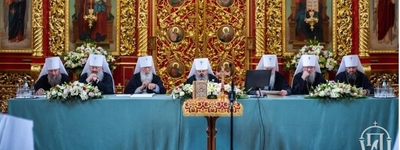Without fear or reproach
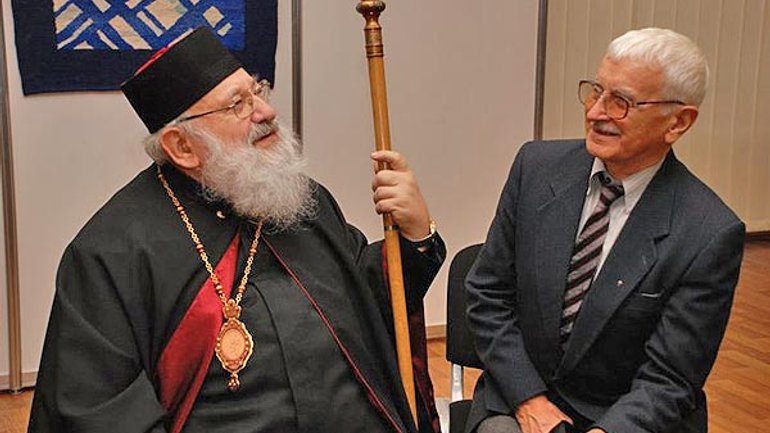
“All we have to decide is what to do with the time that is given us."
(J.R.R. Tolkien)
If in the boredom of old age I decide to write my memoirs, they will certainly include the following scene: I am sitting next to Yevhen Sverstiuk (it needs to be me and some prominent figure). In a half whisper we exchange thoughts about current affairs. “It may have never been as bad as it is now,” he says to me. “Excuse me, but should you be saying that?” I wonder. “Yes, of course. But you understand what I have in a mind – it was an entirely different time.” Since I genuinely hope that I never EVER write memoirs, I include this short dialogue here. First, because it could have become an epigram, if one hadn’t already been chosen. Second, because we were whispering while sitting next to the Major Archbishop of the UGCC Patriarch Lubomyr Husar – right before he was to present his audiobook “The Path to God.”
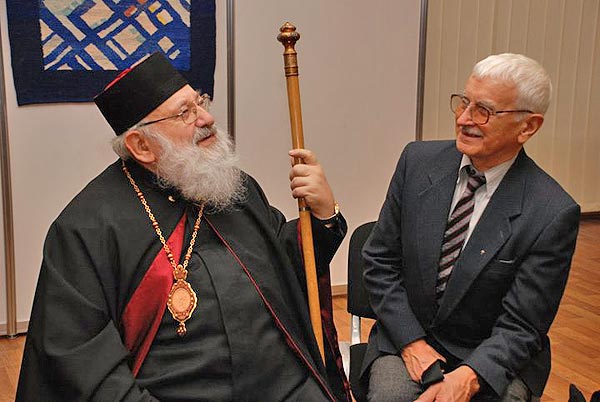 The 10th year anniversary of the patriarch’s ministry is a good occasion to think about time – not only about how much has passed but how it was spent. Patriarch Lubomyr became the head of the church (actually 15 years ago, not 10, when he became auxiliary bishop to the already frail Cardinal Myroslav Ivan Lubachivsky) during a critical time. It may not have looked so critical. No longer did anyone doubt that the UGCC would be revitalized. Moscow’s indignation in connection with the “trampled Galician eparchies” had become chronic. The government in the early Kuchma years was not noted for being reasonable in church affairs, but in its region the UGCC had enough power to feel safe. And in 2001 when Patriarch Lubomyr was chosen and approved by the Roman Pontiff as the Major Archbishop of the UGCC, the central government no longer allowed itself to ruthlessly interfere in church politics.
The 10th year anniversary of the patriarch’s ministry is a good occasion to think about time – not only about how much has passed but how it was spent. Patriarch Lubomyr became the head of the church (actually 15 years ago, not 10, when he became auxiliary bishop to the already frail Cardinal Myroslav Ivan Lubachivsky) during a critical time. It may not have looked so critical. No longer did anyone doubt that the UGCC would be revitalized. Moscow’s indignation in connection with the “trampled Galician eparchies” had become chronic. The government in the early Kuchma years was not noted for being reasonable in church affairs, but in its region the UGCC had enough power to feel safe. And in 2001 when Patriarch Lubomyr was chosen and approved by the Roman Pontiff as the Major Archbishop of the UGCC, the central government no longer allowed itself to ruthlessly interfere in church politics.
It seemed that the turbulent era was over. When Cardinal Lubomyr assumed control of the church, it had two possible paths: to say “at home” as a regional church on its “historical lands,” or to break free from this ghetto. In truth, there probably wasn’t a choice – Moscow’s appeals (I have in mind “the most liberal” ones) for the UGCC to remain “regional” with no presence outside of Galicia lead to nowhere. What does the path promise? In the spiritual perspective it promises to keep to itself, which sooner or later dismisses everything “foreign” as “unjust” and leads to self-conceited decay. In the sociopolitical context this would only further enforce the contrived and so far rather ephemeral border between Galicia and the rest of Ukraine.
That is why there was no choice. And the leadership of the UGCC redirected its energy, which brought back a place in the sun for the church. After ten years of Lubomyr Husar in control, the UGCC is without a doubt a national church with a clearly formulated social and church mission. The UGCC took a bold step across the Dnipro River, which confirms that the church is “nationwide” and that it claims the honor of being an heir of St. Volodymyr’s baptism. It has declared its readiness to take part in a dialogue to reconcile and reunite with the Ukrainian Orthodox Churches. At the time it sounded unbelievable if not comical: The Orthodox can’t agree on anything, and now the conflicts between Catholicism and Orthodoxy are brought into the picture.
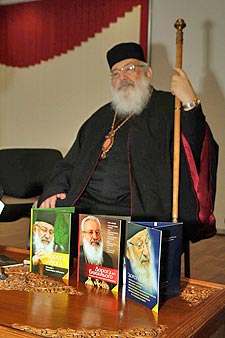 “We understand that this will not happen today, not tomorrow,” Patriarch Lubomyr has said many times. “But it doesn’t mean we shouldn’t do anything. If we don’t work for it, it will never happen.” This phrase is the strategy of a “historical personality,” or, rather, of a person, who tries his best to spend the time allotted to him. The time given is not only a designation of when, but the whole palette of circumstances in that period. What these ten years were for Ukraine and the world is to a large extent what they were for the church and for each one of us.
“We understand that this will not happen today, not tomorrow,” Patriarch Lubomyr has said many times. “But it doesn’t mean we shouldn’t do anything. If we don’t work for it, it will never happen.” This phrase is the strategy of a “historical personality,” or, rather, of a person, who tries his best to spend the time allotted to him. The time given is not only a designation of when, but the whole palette of circumstances in that period. What these ten years were for Ukraine and the world is to a large extent what they were for the church and for each one of us.
After ten years of his ministry, His Beatitude Lubomyr is someone people – both “his” and “foreigners” – listen to. In one hundred years, people might think that it wasn’t difficult to hold such a position in Ukraine because against the background of intra-Orthodox conflicts, the Orthodox leaders’ immersion in political and financial projects, and the attempt to make Christian values correspond to the “evergreen ideology,” anyone guided by the Truth, and not by the next elections, will shock the public and acquire deserved respect.
If many church leaders believe that their authority is mostly the authority of the Church of Christ, earned throughout the 2000 years of Christianity, then the individual authority of Patriarch Lubomyr is supported in many ways by the authority of the UGCC in the society. This may seem like a mystery for “media-politicians” and for the new “media-society” in general, which has lost its foothold in a world where the measure of values is replaced by ratings, where “assemblies” determine the quality of a film, where a “bestseller” is synonymous with a “good book.” In a world of simulacra, simulated reality, “political expediency,” only one thing is truly shocking – that which is real. At first glance it is very simple. Like a children’s tale where good is good and evil is evil and where the choice of the hero – if he wishes to remain a hero and not become a villain – is predetermined.
But it will not end like this. The authority of the head of the UGCC is related primarily to the fact that with every appearance, with his politics, he demonstrates something else –something of a different category, another way of thinking, another view on a person or the world, other aspirations. We suddenly discover this “other” – near us, in our lives. We must slightly change our viewpoint. And we can thank the patriarch’s special gift of persuasion for our faith that the “other” is real.
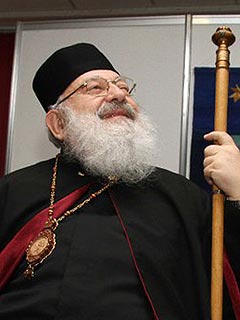 The goals that the patriarch sets surprise us for their prospects are not traditional for modern Ukraine. We concentrate so much on our own “hard times” that we forget about everything else. Well, how many Ukrainians would associate the word “schism” not with the UOC-KP but with the Great Schism? We ourselves don’t see this, as we crawl around our relatively comfortable spiritual-denominational ghettos, using the words “Orthodoxy” and “Catholicism” instead of “Christianity.” We forget about Christ. The true task of the person who serves the Word of God is to return the essence of things and words, to return to the church its essence, its blurred customs and rites, to return the church to the society, to return God to the people, and the people to God.
The goals that the patriarch sets surprise us for their prospects are not traditional for modern Ukraine. We concentrate so much on our own “hard times” that we forget about everything else. Well, how many Ukrainians would associate the word “schism” not with the UOC-KP but with the Great Schism? We ourselves don’t see this, as we crawl around our relatively comfortable spiritual-denominational ghettos, using the words “Orthodoxy” and “Catholicism” instead of “Christianity.” We forget about Christ. The true task of the person who serves the Word of God is to return the essence of things and words, to return to the church its essence, its blurred customs and rites, to return the church to the society, to return God to the people, and the people to God.
Certainly in the near future Patriarch Lubomyr will be described as a good politician who delicately perceives the peculiarities of the moment, a wonderful diplomat who magnificently balances between Rome, Lviv, and Kyiv, the “Patriarch-Manager” (may the ROC ideologues please excuse me) who was able to create a structure where various vectors and interests coexist, which doesn’t submit to destructive tendencies. He will be defined as a leader who is not afraid of competition and who has allowed other UGCC figures to come into the picture. The public will be intrigued by the possibility of a successor for there will be a choice. He will be depicted as someone to the likes of a guru for secular people who gather around him with their “eternal questions.”
All of this would be the truth. But it is not enough, at least not for me. All this is too…rational, or something. This is enough for genuine and deep respect. For honor. But all of this together means nothing for the children’s happiness at meetings, the readiness to listen carefully and nod after each phrase. During the Christmas Prosphora, as I looked at the elder, who stood alone in a ray of light – white-bearded, propped by a cane, completely immersed in himself – I searched for an answer, the key to the secret of his influence and charm. Something without which the deepest wisdom remains only wisdom, and the brilliant communication skills, only the ability to present oneself in a way others expect.
I think I found the answer. I hope readers will forgive me for this weakness (women naturally feel admiration for chivalry). With his courage to do what must be done and the humility to accept what happens. With his proud desire to belong to himself and to God. With his willingness to serve his lady – the Church and his one Queen. At all times.
Pictures from the Information Department of the UGCC







